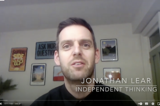How can I make learning really real for my primary class?
We asked Associate, author of the Guerrilla Curriculum and primary school deputy and teacher Jonathan Lear.

Scroll down to read Jonathan's reply in full
"Okay so, how can I make learning really real for my primary class?
There's a couple of ways of thinking about this and first of all the easiest way of making learning real is just to do real stuff – so, thinking about authenticity and in particular thinking about critical audience for children's work and giving it a real purpose.
At my school we spent quite a bit of time working on this and basically trying as much as we can to bring outside experts into school, to offer their expertise and to set the bar in terms of children, because as primary practitioners we can't do everything.
We're not necessarily specialists and we're certainly not experts in a whole range of different fields. But, what if we could bring those people in, for example if we're working on some kind of engineering project then can we get engineers to come into school and talk to the children about what it means to be an engineer and again, that lends itself great authenticity to the work?
The Greatest Motivator
In an ideal world, we might be able to get those people into the start off a particular project, to have them talk to the children about the nature of their work, but then also come back in at the end and have them critique the children's work because there's no greater motivator for children than knowing that their work's going to be viewed by somebody who actually knows what they're talking about.
There's nothing wrong with kids sharing their work with their teachers, with their peers, with their parents because that's a good thing, but it really ups the ante and adds a level of positive pressure. This is because if those children know it's going to be witnessed or viewed by people that know what they're talking about.
This helps us build on that authenticity again and really works well with a critical audience. We've have managed it at our school just by bothering people, just by ringing and emailing universities, local industry organizations and anyone that we think might be able to come in and enhance the work with our children.
We've had a whole range of different people coming in from architects, engineers, artists, dancers, faith leaders and our overriding thought with it all is that we need these people in and they need to come in for free and, they need to come in because it's in the interest of these children!
It’s important to note that haven't got a lot of money as a school but, we don't need it - we've given our subject leaders some little pockets of time to start sending those emails, making those phone calls and what we found over time is that incrementally we've managed to build that kind of expert base that we can call upon to really kind of raise expectation in terms of our children's work.
So, building authenticity and seeking out that critical audience- that's one way!
Searching for Philosophical Concepts
Another way would be through something we developed again at our school and called concept-based learning - this draws upon philosophical concepts because as well as making learning real, the other thing we want and we're aiming for is to make it relevant, to build some connection between the stuff we're doing in curriculum and the kids’ lives, as well as between stuff that's going on - philosophical concepts can help with that.
In one particular project that deals with the geography curriculum in upper key stage two, there's a bit around volcanoes, earthquakes and natural disasters and, again the usual way of operating would be to build a topic around that and create cross-curricular links.
But what we do instead is look for philosophical concepts that we could explore through that particular bit of the curriculum. We might look at concepts like adversity, resilience, change, equality, community, any one of those. Then, what we aim to do is create cohesion or a cohesive project based around those philosophical concepts - this creates a point at which we can start.
Kids Who Are Bothered
There was a great educationist Dorothy Heathcote and she used a phrase called ‘dropping to the universal’ and it was her belief that in any given piece of learning, you need to drop to a universal, shared understanding. And volcanoes, earthquakes, natural disasters are almost an abstract concept, something on the other side of the world doesn't really relate to the kids but, a concept like adversity, well we can all recognize aspects of adversity within our own lives.
And, then we can build from there. So, we start with concepts that we can identify with and that helps us create that thread to these other parts of the curriculum, where we can identify those kinds of concepts in other people too, others who might experience adversity.
Ultimately that gives us a curriculum where kids are bothered, kids care, it’s relevant and it’s real."
You can check out all the other 'tracks' on our CPD Jukebox by clicking here. [ITL]
To find out more about booking Jonathan for your school, college or organisation call us on 01267 211432 or drop us an email on learn@independentthinking.co.uk.
Enjoy a free no-obligation chat.
Haggle a bit. Make a booking.
Call us on +44 (0)1267 211432 or drop us a line at learn@independentthinking.co.uk.

About the author
Jonathan Lear
Jonathan Lear is a highly skilled and experienced teacher and deputy head in an inner-city primary school who is rewriting the rules when it comes to curriculum design and delivery. He is the author of Guerrilla Teaching and the Monkey-Proof Box.